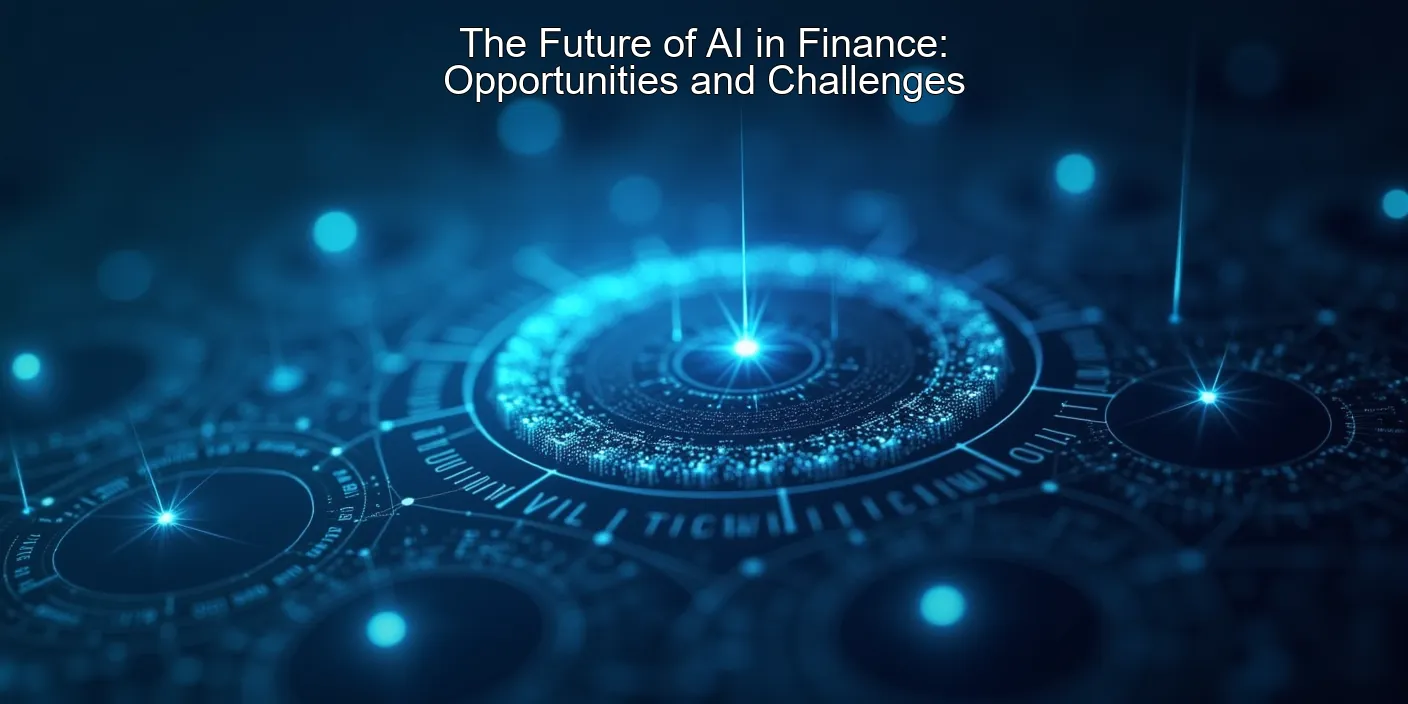The AI Revolution in Financial Services: Transforming Banking and Investment
| Key Aspects | AI Applications |
|---|---|
| Risk Assessment | Machine Learning Models |
| Customer Service | Chatbots and Virtual Assistants |
| Fraud Detection | Pattern Recognition Algorithms |
The financial services industry is undergoing a profound transformation, driven by artificial intelligence. Here’s how AI is reshaping banking and investment:

#FinanceAI, #FinancialServices, #AIImpact
- Automated credit scoring and risk assessment
- Personalized financial advice and product recommendations
- Real-time fraud detection and prevention
- Algorithmic trading and portfolio management
“AI is not just a tool in finance; it’s becoming the new operating system for the industry.” – David Siegel, CEO of Investopedia
FAQ: AI in Financial Services
Q: How does AI improve risk assessment in banking?
A: AI analyzes vast amounts of data to assess creditworthiness more accurately than traditional methods.
Q: Can AI really predict market trends?
A: While not infallible, AI can identify patterns and correlations in market data that humans might miss.
Q: Is AI making human financial advisors obsolete?
A: AI complements human advisors, handling routine tasks and providing data-driven insights.
5 Ways to Leverage AI in Your Financial Strategy
- Use AI-powered budgeting apps for personalized financial planning
- Explore robo-advisors for cost-effective investment management
- Utilize AI chatbots for quick customer service inquiries
- Consider AI-driven fraud protection services for enhanced security
- Stay informed about AI advancements in finance through reputable sources
According to a 2022 Deloitte survey, 70% of financial services firms are using AI technologies, with an additional 21% planning to implement AI within the next two years.
Ethical Considerations in AI-Driven Finance

| Ethical Concern | Potential Solution |
|---|---|
| Data Privacy | Robust Encryption and Consent Protocols |
| Algorithmic Bias | Diverse Training Data and Regular Audits |
| Transparency | Explainable AI Models |
As AI becomes more prevalent in finance, ethical considerations come to the forefront. Here are key areas of concern:
“AI in Finance: Rising Ethical Concerns Explored”
- Ensuring fairness in AI-driven lending decisions
- Protecting customer data from breaches and misuse
- Maintaining human oversight in critical financial operations
- Addressing the potential job displacement in the sector
“The ethical use of AI in finance is not just a regulatory requirement; it’s a competitive advantage.” – Cathy Bessant, Chief Operations and Technology Officer at Bank of America
FAQ: Ethical AI in Finance
Q: How can we ensure AI doesn’t discriminate in lending?
A: Regular audits of AI models and diverse training data can help mitigate bias.
Q: What role do regulators play in AI finance?
A: Regulators are developing frameworks to ensure responsible AI use in financial services.
Q: Can AI decisions in finance be explained to customers?
A: Explainable AI models are being developed to provide transparency in decision-making.
Best Practices for Ethical AI in Finance
- Implement robust data governance and privacy policies
- Conduct regular ethical audits of AI systems
- Provide clear explanations of AI-driven decisions to customers
- Invest in ongoing AI ethics training for employees
- Collaborate with regulators to develop ethical AI standards
A 2023 study by the World Economic Forum found that 85% of financial institutions consider ethical AI implementation a top priority for the next five years.
As we navigate this AI-driven financial landscape, it’s crucial to balance innovation with responsibility. The Ethical AI considerations in finance will shape not only the industry’s future but also its relationship with consumers. Meanwhile, the rapid pace of AI Innovations continues to open new possibilities in financial services.
For those interested in how these changes affect daily life, explore our insights on AI in Everyday Life. And if you’re curious about AI’s impact beyond finance, check out how AI in Entertainment is reshaping another major industry.
The Impact of AI on Financial Services: Revolutionizing the Financial Landscape
Artificial Intelligence (AI) is rapidly transforming the financial services industry, ushering in a new era of efficiency, personalization, and innovation. From automated trading to fraud detection, AI technologies are reshaping how financial institutions operate and serve their customers. Let’s dive into the profound impact of AI on financial services and explore how it’s changing the game for both providers and consumers.
The AI Revolution in Financial Services

| Key Areas | AI Applications |
|---|---|
| Customer Service | Chatbots, Virtual Assistants |
| Risk Management | Predictive Analytics, Fraud Detection |
| Trading | Algorithmic Trading, Market Analysis |
| Personal Finance | Robo-Advisors, Budgeting Apps |
- Enhanced customer experience through personalized services
- Improved risk assessment and fraud prevention
- Increased operational efficiency and cost reduction
- More accurate market predictions and investment strategies
“AI is not just a tool in financial services; it’s becoming the very foundation of how we operate and innovate in the industry.” – Jamie Dimon, CEO of JPMorgan Chase
“AI: The Backbone of Financial Innovation – Insights from JPMorgan’s CEO”
82%82%95%
Q: How is AI improving customer service in banking?
A: AI-powered chatbots and virtual assistants provide 24/7 support, handle routine inquiries, and offer personalized financial advice, enhancing customer satisfaction and reducing wait times.
Q: Can AI really predict market trends?
A: While not infallible, AI algorithms can analyze vast amounts of data to identify patterns and trends, helping traders and investors make more informed decisions.
Q: Is AI making human financial advisors obsolete?
A: Not entirely. AI complements human expertise, handling routine tasks and providing data-driven insights, allowing human advisors to focus on complex strategies and client relationships.
5 Ways AI is Transforming Financial Services
- Automating routine tasks and processes
- Enhancing fraud detection and security measures
- Providing personalized financial advice through robo-advisors
- Improving credit scoring and loan approval processes
- Enabling real-time market analysis and trading decisions
According to a recent study by Accenture, AI could add $1.2 trillion in value to the financial services industry by 2035. This staggering figure underscores the transformative potential of AI in reshaping the financial landscape.
Ethical Considerations and Future Outlook
As AI continues to revolutionize financial services, it’s crucial to address ethical concerns and ensure responsible implementation. Ethical AI practices are essential to maintain trust and transparency in financial operations. The future of AI in finance looks promising, with ongoing AI innovations set to further enhance services and create new opportunities.
The integration of AI in financial services extends beyond traditional banking. We’re seeing exciting developments in AI in entertainment, where fintech meets media for innovative payment solutions and personalized content monetization. Moreover, AI is becoming increasingly prevalent in AI in everyday life, with smart personal finance apps and AI-driven budgeting tools helping consumers make better financial decisions.
As we embrace this AI-driven financial revolution, it’s clear that the landscape of financial services will continue to evolve, offering more efficient, personalized, and accessible solutions for businesses and individuals alike. The key to success lies in balancing innovation with ethical considerations, ensuring that AI serves to enhance rather than replace the human touch in financial services.
The Impact of AI on Financial Services: Revolutionizing Banking and Investment
| Key Impacts | Benefits | Challenges |
|---|---|---|
| Automated processes | Increased efficiency | Job displacement |
| Personalized services | Enhanced customer experience | Data privacy concerns |
| Risk management | Improved decision-making | Algorithmic bias |
Artificial Intelligence is reshaping the financial services industry, bringing about unprecedented changes in how banks and investment firms operate. Here are the key areas where AI is making a significant impact:
- Customer service and chatbots
- Fraud detection and prevention
- Algorithmic trading
- Credit scoring and loan approval
- Personalized financial advice
“AI is not just a tool for efficiency; it’s a catalyst for innovation in financial services, enabling us to serve customers in ways we never thought possible.” – Jamie Dimon, CEO of JPMorgan Chase
Frequently Asked Questions
Q: How is AI improving customer service in banking?
A: AI-powered chatbots and virtual assistants provide 24/7 support, answering queries and assisting with transactions, significantly enhancing customer experience.
Q: Can AI really predict market trends?
A: Yes, AI algorithms can analyze vast amounts of data to identify patterns and predict market movements with increasing accuracy, aiding in investment decisions.
Q: Is AI making financial services more secure?
A: Absolutely. AI systems can detect fraudulent activities in real-time, significantly reducing the risk of financial crimes and enhancing overall security.
5 Ways AI is Revolutionizing Financial Services
- Automating back-office operations for increased efficiency
- Providing personalized financial advice through robo-advisors
- Enhancing risk assessment and management
- Improving regulatory compliance and reporting
- Enabling more accurate credit scoring for fairer lending practices
According to a report by Business Insider Intelligence, AI applications are expected to save banks $447 billion by 2023, showcasing the significant financial impact of this technology.
The Future of AI in Finance: Opportunities and Challenges

| Opportunity | Challenge | Potential Solution |
|---|---|---|
| Hyper-personalization | Data privacy | Robust encryption and consent management |
| Predictive analytics | Algorithmic bias | Diverse training data and regular audits |
| Autonomous finance | Regulatory compliance | Collaboration with regulators |
As AI continues to evolve, its impact on financial services will only grow. Here are some key developments to watch:
“AI’s Rising Tide: Transforming Financial Services”
- Integration of AI with blockchain for enhanced security
- Advanced natural language processing for improved customer interactions
- Quantum computing applications in complex financial modeling
- AI-driven sustainable investing and ESG analysis
“The financial institutions that will thrive in the future are those that strategically embrace AI to create value for their customers and shareholders.” – Sundar Pichai, CEO of Alphabet Inc.
Q: Will AI completely replace human financial advisors?
A: While AI will augment human capabilities, the human touch in complex decision-making and relationship-building will remain crucial.
Q: How is AI addressing financial inclusion?
A: AI is enabling alternative credit scoring methods and micro-lending platforms, making financial services accessible to previously underserved populations.
Q: What ethical considerations surround AI in finance?
A: Key ethical concerns include data privacy, algorithmic fairness, and the potential for AI to exacerbate existing financial inequalities.
Tips for Financial Institutions Adopting AI
- Invest in data quality and infrastructure
- Foster a culture of innovation and continuous learning
- Prioritize ethical AI development and deployment
- Collaborate with fintech startups and AI specialists
- Engage with regulators to shape responsible AI policies
A study by Accenture reveals that 86% of bank executives agree that the widespread adoption of AI will transform the industry within the next three years.

As we navigate this AI-driven financial revolution, it’s crucial to balance innovation with responsibility. The future of finance lies in harnessing AI Innovations while ensuring Ethical AI practices. This transformation will not only reshape AI in Everyday Life but also revolutionize AI in Entertainment through innovative financial products and services.



